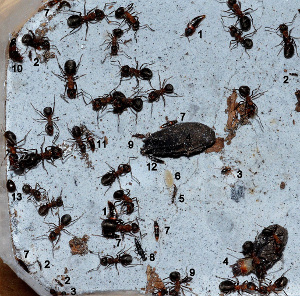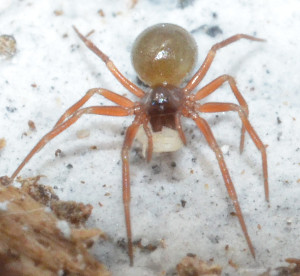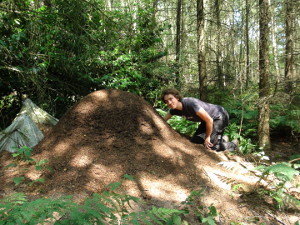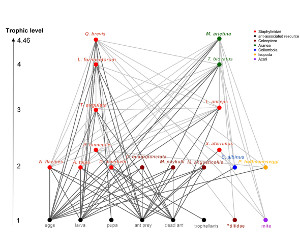
Dr. Thomas Parmentier
Terrestrial Ecology Unit
Department of Biology
Ghent University
K.L. Ledeganckstraat 35
9000 Gent Belgium
Website: https://www.thomasparmentier.com/
E-mail: thomas.parmentier@ugent.be
Research
My research deals with arthropods that are strictly associated with ants. These arthropods, known as myrmecophiles, can only be found inside ant nests or in the close vicinity of ant nests. Their biology is extremely diverse and they range from mutualists to commensalists and to parasites.
During my PhD, I disentangled and characterized different processes and interactions between ants and these arthropods. My main study system was the myrmecophile community associated with mound-building red wood ants (Formica rufa group). One important insight was the fact that red wood ant nests support a complex food web, in which myrmecophiles parasitize on ant brood and ant prey, but also prey on other myrmecophiles (see Parmentier et al. Oikos 2016). Myrmecophile communities are excellent model systems to study meta-community dynamics. This is because they emerge in spatially distinct nests (“patches”), susceptible to colonization from another local community.
In my postdoctoral project, I aim to analyse in depth this spatially distributed food web network by combining empirical studies with theoretical modelling. Hypothesis testing is subdivided in three complementary parts. First, I will survey in high-resolution spatial variation in the myrmecophile food web network across heterogeneously distributed nests of red wood ants. Next, I will test to which degree variation in dispersal and host detection capabilities of the different myrmecophiles depends on species-specific life traits or are conditional to local nest quality and intensity of local competition. Finally, the obtained empirical data will be used to parameterize a spatial network model. Changes in the spatial food web functioning will be theoretically explored under conditions of varying nest availability, changes in productivity, and differences in regional metacommunity richness. Overall, studying myrmecophile communities in a spatial context will propel our understanding of the evolutionary and ecological dynamics in complex communities.
This research is funded by the Ugent (Bijzonder Onderzoeksfonds) and is in collaboration with Prof. Dries Bonte (Ugent), Prof. Frederik de Laender (UNamur) and Tom Wenseleers (Kuleuven).



